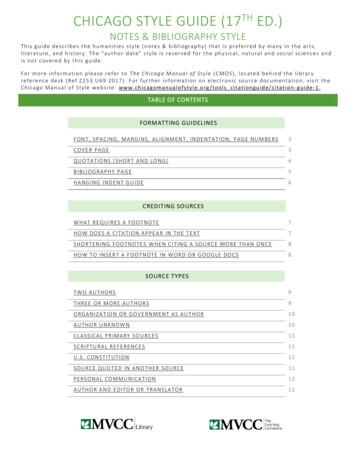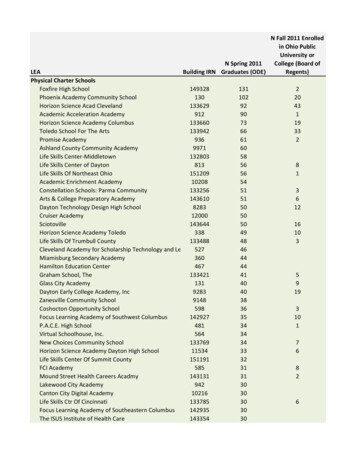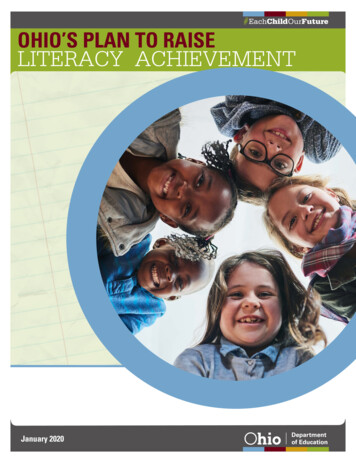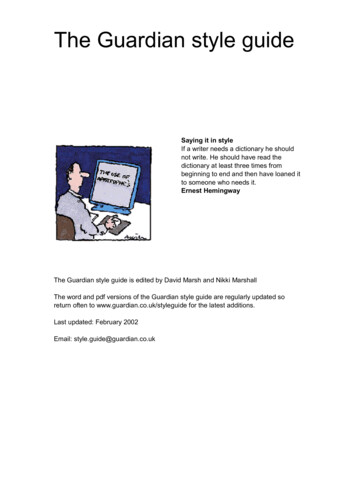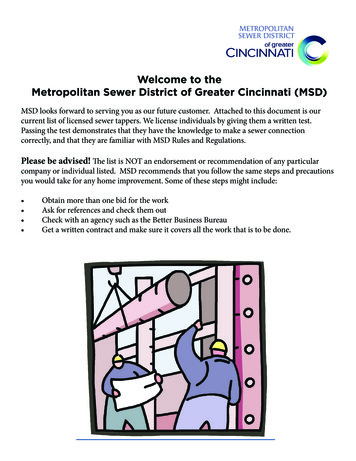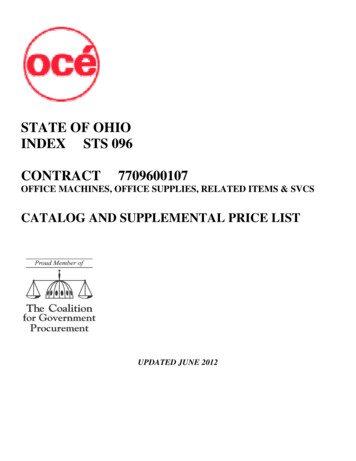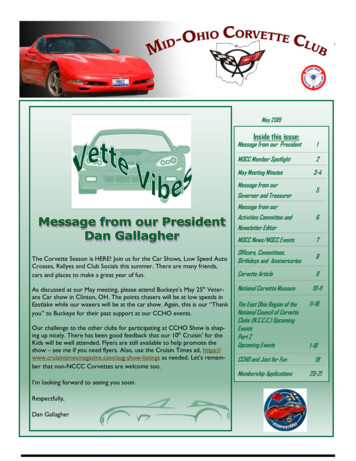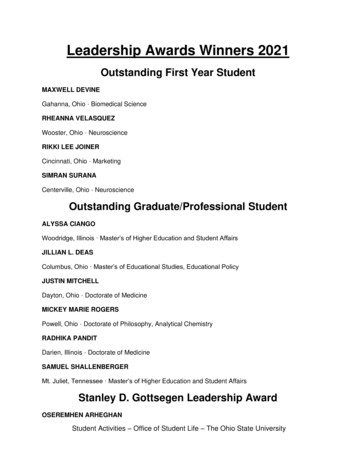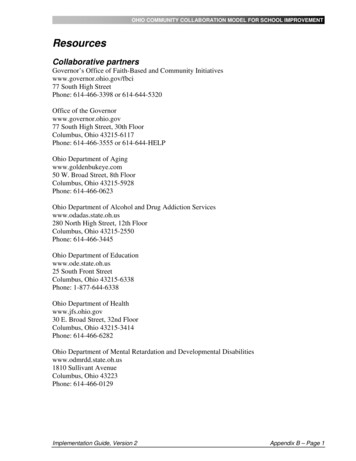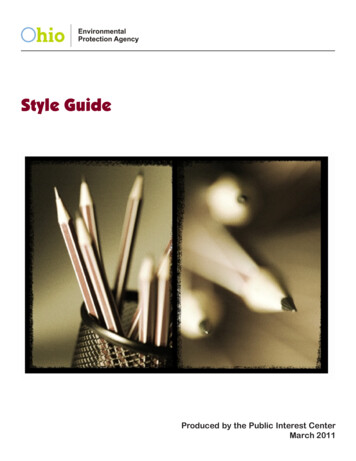
Transcription
Style GuideProduced by the Public Interest CenterMarch 2011
Scott J. Nally, DirectorCathryn Allen and Carol Hester, EditorsCathryn Allen, Layout and DesignOhio EPA is an Equal Opportunity EmployerPrinted on Recycled Paper
A Note from the EditorsWriting TipsThe Public Interest Center (PIC) compiled this styleguide to give Ohio EPA employees a standardreference for use in preparing documents andcorrespondence.PIC uses Associated Press (AP) style when writingand editing public documents. Many of you may befamiliar with other grammar and style guides. There areseveral accepted usages depending on the referencebook you use, but these entries reflect the Agency’spreferred style.Below are a few guidelines to keep in mind whenwriting letters, memos, reports, fact sheets and otherbusiness documents. Keep sentences and paragraphs short, avoidingexcessive punctuation. Avoid using acronyms, if possible. If you use anacronym, always write it out on first reference,followed by the acronym in parentheses. Use language that is easily understood. Ifappropriate, try to convey technicalinformation in a manner that an eighth gradestudent could understand. Simplify terms.Complex:Simple:were in attendanceattendedwill be in attendancewill attendbe of benefit tobenefitfor the purpose oftowas in receipt ofreceivedfor the protection ofto protectmay constitute a threat tocould threatenprior tobeforeif you are a handler ofif you handledue to the fact thatbecause Write in the active voice instead of passive.If the subject acts, the voice is active. If thesubject is acted upon, the voice is passive.The red flag for the passive voice is somevariation of an auxiliary verb (was, will be,have been, is being), plus a past participle(built, written, directed), plus “by” if the actoris mentioned. Here are some examples:Active Voice:Voice: I wrote this book. The publisher gave me an advance. The landfill operator requested apublic hearing.P assive Voice:Voice: This book was written by me. I was given an advance by thepublisher. A public hearing was requested by thelandfill operator.Franklin Covey ’sWriting Advantage TTrainingrainingOhio EPA has provided Franklin Covey’s WritingAdvantage training to interested employees in an effortto improve written communication betweenemployees and our customers. The training is focusedon business and technical writing and provides tips formaking your message accessible, easy to understandand relevant.The information and rules taught in this coursesupport the Agency’s style guide entries. If there is adiscrepancy between the Agency and WritingAdvantage style guides, the Agency’s style should beused.How to Use the Style Guide Entries are listed alphabetically. Many entries simply give the correct spelling. Several entries include Right: or Wrong:examples in italics. Related topics are at the end of the entry inboldface.1
SourcesBates, Jefferson D. 2000. Writing with Precision. Penguin.Brusaw, Charles T. et al. 2003. Handbook of Technical Writing. Seventh Edition. St. Martin's Press.FranklinCovey. 2006. Style Guide for Business and Technical Communication. Salt Lake City. FranklinCovey.Goldstein, Norm (editor). 2004. Associated Press StyleBook and Briefing on Media Law. New York. Basic Books.Joseph, Albert. 1987. Executive Guide to Grammar. International Writing Institute, Incorporated.Ross-Larson, Bruce. 1996. Edit Yourself: A manual for everyone who works with words. W.W. Norton & Co.Strunk Jr., William and E.B. White. 1999.The Elements of Style. Fourth Edition. Longman.2
Aalmost, most - If you can substitute almost for mostin a sentence, use almost.a, an - Use a before consonant sounds: a historicevent, a one-year term (sounds as if it begins with aw).Use an before vowel sounds: an energy crisis, anhonorable man (the h is silent), an NBA record (soundsas if it begins with e), an 1890s celebration.alreadyalready,, all ready - Already is an adverb expressingtime: The shipment had already been made when thestop order arrived. All ready is a two-word phrasemeaning “completely prepared.” He was all ready tostart work on the project when it was canceled.alternate, alternative - Alternate means one andalternate,alternativethen the other: alternate stripes of blue and white.Alternative means providing a choice between twoor more things: alternative routes, or somethingremaining to be chosen: Is there an alternative togoing?accept, except - Accept means to receive. Exceptmeans to exclude. I accept your offer. Everyone wasthere except Bill.acronyms - In general, use them sparingly unless yourreadership is familiar with them. If they must be used,always spell out on first reference, followed by theacronym in parentheses: combined sewer overflow(CSO). No apostrophe is needed when makingacronyms plural. Example: PCBs.a.m., p.m. - Lowercase, with periods.amid - Not amidst.NOTE: U.S. EPA has a list of environmental acronymsonline. Refer to the Helpful References in theappendix.ampersand (&) - Do not use as a replacement for“and”. Use the ampersand only when it is a part of anofficial name of a company, product or other propernoun.administration - Lowercase: the administration, thegovernor’s administration, the Obama administration.When referring to the current state administration,use the Kasich administration (include Kasich’s name).norSee govergovernornor.annual - An event cannot be described as annual untilit has been held in at least two successive years. Donot use the term “first annual.” Instead, note thatsponsors plan to hold an event annually.apostrophes - Examples: Plural nouns not ending in s: Add ’s: thealumni’s contributions, women’s rights. Plural nouns ending in s: Add only anapostrophe: the girls’ toys, states’ rights,the ships’ wake. Singular nouns not ending in s: Add ’s:the city’s needs, the girl’s toys. Always use ’s if the word does not end in theletter s: Nally’s policies, the company’s waste,Marx’s theories. Singular common nouns ending in s: Add ’sunless the next word begins with s: thehostess’s invitation, the hostess’ seat. Singular proper names ending in s: Use only anapostrophe: Achilles’ heel, Agnes’ book,Socrates’ life. Apostrophes are used to show possession,not to make words plural. Use in place of omitted figures, but not tomake figures plural. Right: ‘60s and 1960s.Wrong: ‘60’s or 1960’s.adviser - Not advisor.affect, effect - Affect means to influence: The gamewill affect the standings. Effect, as a verb, means tocause: He will effect many changes in the company.Effect, as a noun, means result: The effect wasoverwhelming. It was a law of little effect.afterward - Not afterwards.afterterwardAgency - When referring to Ohio EPA on secondreference, it is customary to capitalize Agency. Note:This is our style and breaks the general rule foravoiding capitalization whenever possible. Seecapitalization and Ohio EPA.EPAagenda - A list. It takes singular verbs and pronouns.The agenda has been revised. The plural is agendas.aid, aide - Aid is assistance. Aide is a person whoserves as an assistant.3
Appalachia - In the broadest sense, Appalachiaapplies to the region along the Appalachian Mountainsfrom Maine into northern Alabama. In a sense thatoften suggests economic depression and poverty,Appalachia refers to parts of eastern Tennessee,eastern Kentucky, southeastern Ohio and the westernportion of West Virginia. When using this word, specifythe extent of the area in question.bibliographies - Appear at the end of chapters,articles and books. Whatever the exact format,complete bibliographic entries include the name ofthe author, the title and the full publication history.Refer to the appendix for more information andexamples.billion - Use figures in all except casual uses. The totalcost was 2 billion. The population reached 4 billion.assure, ensure, insure - Use assure to make aperson sure of something: I assure you I will be there.Use ensure to mean to guarantee something: Stepswere taken to ensure accuracy. Use insure forreferences to insurance: The policy insures his life.bimonthly - Every other month. Semimonthly meanstwice a month.biweekly - Every other week. Semiweekly meanstwice a week.attorneyattorneyney,, lawyer - A person with a law degree is alawyer. A person who acts on behalf of anotherperson is that person’s attorney. Therefore, a lawyercan be John Smith’s attorney or the attorney for JohnSmith or even an attorney in the Smith case, butattorney should not be used in such references as “aColumbus attorney” or “an Ohio attorney” or “a patentattorney” or simply “an attorney.” When in doubt, uselawyer. Do not abbreviate, and capitalize only whenreferring to an officeholder’s title, such as: DistrictAttorney Tom Robbins.board of directors, board of tr ustees - Alwayslowercase. A member of the board is a director ortrustee.brownfields - One word.bureau - Capitalize when part of the formal name ofan organization or agency: the Bureau of MotorVehicles. Lowercase when used alone.business/organization/company - Businesses,organizations or companies are treated as one unitand should be referred to in the singular. Therefore,when referring to a business, organization or company,use the proper name on the first reference and ‘it’ onsubsequent references. Right: The Smith Company’sfine included penalties for surface water violations atits Dayton plant. Wrong: The company moved theiroperations to Pennsylvania. See collective nounsnouns.Bbad, badly - Bad is an adjective, as in a badaccident. Badly is an adverb that describes howsomething is done, as in the plant was badlymaintained. Wrong: He felt badly when the decisionwas delayed.because, since - Use because to denote a specificcause-effect relationship: He went because he wastold to attend. Since is acceptable in a casual sensewhen the first event in a sequence led logically to thesecond but was not its direct cause: He went to thegame, since he had been given the tickets.Ccannot - One word.capital, capitol - Capital is the city where a seat ofgovernment is located, and it is also used in thefinancial sense to describe money or property. Do notcapitalize. When referring to the specific building inWashington and state equivalents, use capitol, whichshould be capitalized. The Ohio Capitol is inColumbus.beside, besides - Beside means at the side of.Besides means in addition to.biannual, biennial - Biannual means twice a year andis a synonym for the word “semiannual.” Biennial meansevery two years.capitalization - Avoid unnecessary capitals. Use aspart of official name, but not in condensed version.Right: The Division of Air Pollution Control is writingrules. The division issued a permit. Wrong: Wereleased the Strategy today.4
CD-ROM - all uppercase.CD-ROMcommittee - Do not abbreviate. Capitalize when partof a formal name: the Labor Management Committee.Use lowercase on second reference: The committeemet last week.chairman - Use chairman if the person is a man,chairmanchairwoman if the person is a woman and presidingofficer or committee head if the position is theoretical.Do not use chairperson unless it is an organization’sformal title for an office. Avoid using chair unlessspecifically requested by the person in that position.company/business/organization - See business/organization/company.complement, compliment - Complement meanscompleting or supplementing something. Complimentis an expression of praise.chief - See titles.citations - Bibliographic entries that enable writersto identify the sources of their information within thetext. The methods of citation vary dependingon the technical field and its traditions, the type ofpublication and the publisher. Refer to the appendixfor more information and examples.continual, continuous - Continual means happeningover and over, or frequently repeated: Writing welltakes continual practice. Continuous meansuninterrupted, steady, unbroken: A continuous streamof water flowed from the pipe.city - Capitalize as part of a proper name: New YorkCity. Lowercase elsewhere: the city government, thecity Board of Education; and all “city of” constructions.Use City on second reference when referring to aspecific city government if the context does notrequire the city name: We issued a permit to the cityof Dayton. The City then began building the plant.county - When writing about one county, capitalize:Wayne County. When writing multiple counties,lowercase: Stark, Wayne and Medina counties. Withouta specific county name, use lowercase: the countybudget. When referring to a specific county onsecond reference, use County when the context doesnot require using the county name. See citycity.cleanup, clean up, clean-up - One word as anoun: The cleanup will take two months. Two wordsas a verb: The company must clean up the spill.Hyphenated when used as an adjective: The clean-upplan is a public record.courtesy titles - For federal, state or county electedcourtesyofficials, address correspondence to The Honorable(person’s name). The salutation should read Dear (title)(name). Do not abbreviate senator or representative.Example:The Honorable Joe SmithOhio SenateColumbus, OH 43266collective nouns - Nouns that denote a unit takesingular verbs and pronouns: business, class,committee, company, crowd, family, group, herd, jury,orchestra, organization, team. Some usage examples:The staff is confused. The committee is meeting to setits agenda. The jury reached its verdict. The companyviolated its permit. A herd of cattle was sold.Dear Senator Smith:For members of the U.S. House of Representatives, thesalutation should read Dear Congressman orCongresswoman (name). Courtesy titles are notnecessary for local officials.commas - Use commas to separate elements in aseries, but do not place a comma before theconjunction in a simple series. Right: The rule will beimplemented on municipal, state and federal levels.Wrong: The rule will be implemented on municipal,state, and federal levels. Always place a comma aftera date. The Declaration of Independence was signedJuly 4, 1776, in Philadelphia. Dec. 7, 1941, is a day thatwill live in infamy. After reviewing your Aug. 4, 2008,letter, I have decided to proceed. Do not place acomma between the month and year when no date isgiven: A notice was sent in December 2007. Seedatesdates.Ddash - Use the dash to denote an abrupt change inthought in a sentence or an emphatic pause. Thecorrect way to format a dash is to hit the hyphen key(the one next to the number 0 on the keyboard)twice. There should be a space on both sides of adash. Be aware that some word processing programswill automatically “correct” your dash -- that’s okay.Smith offered a plan — it was unprecedented — toraise fees (note “corrected” dash).5
data - Plural form of datum, meaning a fact used todraw a conclusion or make a decision.dollars - Use figures and the sign in all exceptcasual references (Can I borrow a dollar?) or amountswithout a figure (Dollars are flowing overseas). Forspecified amounts, the word takes a singular verb: Hesaid 50 is what they want. For amounts of 1 millionor more, use the and numerals up to two decimalplaces: He is worth 4.35 million. For amounts lessthan 1 million: 4, 25, 500, 1,000, 650,000.database - One word.dates - No comma between month and year if noday is included. Right: June 2008. June 1, 2008. Wrong:June, 2008. Always use Arabic figures without st, nd,rd or th. When a month is used with a specific date,abbreviate only Jan., Feb., Aug., Sept., Oct., Nov. andDec. Spell out months when using alone, or with a yearalone. Use commas to offset the date from the rest ofthe sentence: On July 24, 2007, you sent a letter. YourJuly 24, 2007, letter was informative.downgradient - One word.Eeffect, affect - Effect, as a verb, means to cause: Hewill effect many changes in the company. Effect, as anoun, means result: The effect was overwhelming. Itwas a law of little effect. Affect means to influence:The game will affect the standings.degrees - Do not capitalize academic degrees whenthey are spelled out. He had a master of science (’s isomitted). Specifically, his master’s was in engineering(’s is included when replacing degree). Abbreviatedegrees when they follow a person’s name.e.g., i.e. - e.g. stands for the Latin exempli gratia,which means for example. To avoid confusion, simplywrite “for example”. i.e. is an abbreviation for the Latinid est. Say “that is” to avoid misunderstanding. Insert acomma before and after: Some problems, forexample, pollution, energy shortages or housing, canbe solved by technology.demolish, destroy - Both mean to do away withsomething completely. Something cannot be partiallydemolished or destroyed. It is redundant to say totallydemolished or totally destroyed.director - Refer to as Director Scott J. Nally. Capitalizedirector only if it immediately precedes name.either - Use it to mean one or the other, not both.Right: She said to use either door. Wrong: There werelions on either side of the door.division/office - When referring to a division, office,department or program (not section) such as theDrinking Water Assistance Fund, should the title becapitalized? If it is a vague reference, use lower case.If it is the official name of the fund or program,capitalize on the first reference and when using the fulltitle. On the second reference, lowercase unless usingthe full title. For instance: Ohio has a drinking waterassistance fund that finances water improvementprojects throughout the state. Ohio EPA's DrinkingWater Assistance Fund, managed by the Division ofDrinking and Ground Waters, financed the project. Thedivision financed more than 100 projects in the lastfiscal year.email - Lowercase, no hyphen.engine, motor - An engine develops its own power,usually through internal combustion or the pressureof air, steam or water: automobile engine, steamengine. A motor receives power from an outsidesource: an electric or hydraulic motor.enquire, enquirenquiryy - The preferred words are inquire,inquiry.ensure, assure, insure - Ensure to mean to guaranteesomething: Steps were taken to ensure accuracy.Assure to make a person sure of something: I assureyou I will be there. Use insure for references toinsurance: The policy insures his life.entitled - A right to do or have something. Do not useit to mean titled. Right: She was entitled to thepromotion. Wrong: The publication was entitled “OhioIntegrated Report.”6
exceedance - Can also be spelled exceedence, butexceedance is preferred.fund-raiser - Hyphenate when referring to a person’sposition or to a social event. He is a fund-raiser for theorganization.except, accept - Except means to exclude. Acceptmeans to receive. Everyone was there except Bill. Iaccept your offer.fund-raising - Hyphenated as a noun and a modifier.The fund-raising event.FGfartherther - Farther refers to physical distance:fartherther,, furfurtherHe walked farther into the woods. Further refers to anextension of time or degree: She will look further intothe mystery.geographic terms and names - Lowercase north,termssouth, east and west and variations when they indicatedirection. Capitalize north, south, east, west and similarterms when they refer to regions or Ohio EPA districts:Northwest Ohio, Southwest District.fax - The abbreviation for facsimile. The noun is notcapitalized except when it appears on a form whereother headings (Address, Phone, Fax, E-mail) arecapitalized.good, well - Good is an adjective that meanssomething is as it should be or is better than average:He is a good pitcher. I feel good. When used as anadverb, well means in a satisfactory manner orskillfully: She performed well at the recital.federal - Do not capitalize except when referring toan architectural style or part of a formal name: thefederal government, Federal Express, the FederalHousing Administration.governor - Refer to as Governor John R. Kasich.governorLowercase without a name: the governor of Ohio.Instead of the governor, always refer to Ohio’sgovernor as Gov. Kasich (include name). See titlestitles.fewerfewer,, less - In general, use fewer for individual items,less for bulk or quantity. Fewer than 10 applicantsapplied (individuals). I had less than 50 in my pocket(an amount). But: I had fewer than 50 1 bills in mypocket (individual items).ground water - Two words.Hflammable, inflammable - avoid using inflammablebecause it has contradictory meanings: “able to burn”and “not able to burn.”health department - Capitalize only if referring to adepartmentspecific health department.flood plain - Two words.highway patrol - Capitalize if used in the formalname of a police agency: the Ohio Highway Patrol,the highway patrol.flood stage - Two words.his/her - When using these personal pronouns, usehis/her, his or her. You can also use his or her(combined). Do not use the plural they.floodwaters - One word.footnotes - A common method of citing sources.Footnotes originally appeared at the bottom of a page,but now usually appear at the end of a chapter orarticle, making typing and layout easier. Refer to theappendix for more information and examples.home page - Two words, not capitalized.hopefully - Means in a hopeful manner. Avoid usingin this context: Hopefully, the fighting will end soon.Instead, use we hope or I hope.foreword - A page at the beginning of a publication.Not forward.hyphen - Hyphens are joiners. Use them to avoidambiguity or to form a single idea from two or morewords. He re-covered the leaky roof. Compoundmodifiers: 100-year flood plain, a well-known man, thelandfill was non-compliant. For hyphenation showing arange: He received a 10- to 20-year prison sentence.fractions - Spell out amounts less than one, usinghyphens between the words: one-third, three-fifths.7
Iless, fewer - In general, use fewer for individualitems, less for bulk or quantity. Fewer than 10applicants applied (individuals). I had less than 50 inmy pocket (an amount). But: I had fewer than 50 1bills in my pocket (individual items).i.e., e.g. - See e.g., i.e.illegal - Use illegal only to mean a violation of the law,not a violation of a contract or rule.liaison - Commonly mispelled.in-depth - Hyphenated.listserlistservv - One word, lowercase, no e on the end.injuries - They are suffered, not sustained or received.Internet - Capitalized. The abbreviation, Net is alsoInternetide Webcapitalized. See World WWideWebeb.local emergency planning committee (LEPC) Capitalize only if referring to a specific LEPC. Seehealth depar tmenttment.intranet - Not capitalized.Mme, myself or I - Use myself only when you haveused I earlier in a sentence: I want to complete thatproject myself. You can clear up confusion byeliminating the first reference. You would not say:The IRS sent a refund check to myself. You would say:The IRS sent me a refund check.it’s, its - It’s is a contraction for it is or it has: It’s up toyou. It’s been a long time. Its is the possessive form ofthe neuter pronoun: The company lost its assets. Its’ isnever a proper spelling.Jmedia - A plural noun. The media were plentiful at thepublic meeting.judgment - Not judgement.Kmiles per hour - The abbreviation mph (no periods)is acceptable in all references.kids, children - Do not use kids except in veryinformal references. When in doubt, use children.million - Use figures in all except casual uses. The totalcost was 2 million. The population reached 4 million.Lmore than, over - More than generally refers toquantity: More than 50 people returned the survey.Over generally refers to spatial relationships: The dogjumped over the fence.landfill, landfilling - One word, when used as nounand a verb. Instead of recycling, the companylandfilled the materials.lawyerney - A person with a law degree is alawyer,, attorattorneylawyer. A person who acts on behalf of another is anattorney. Therefore, a lawyer can be John Smith’sattorney or the attorney for John Smith or even anattorney in the Smith case, but attorney should not beused in such references as “a Dayton attorney” or “apatent attorney” or simply “an attorney.” When indoubt, use lawyer. Do not abbreviate. Capitalize onlywhen referring to an officeholder’s title, such as:District Attorney Tom Robbins.most, almost - If you can substitute almost for mostin a sentence, use almost.motormotor,, engine - A motor receives power from anoutside source: an electric or hydraulic motor. Anengine develops its own power, usually throughinternal combustion or the pressure of air, steam orwater: automobile engine, steam engine.leach field - Two words.legislators - See cour tesy titlestitles.8
NPnationwide - One word.parentheses - The temptation to use parentheses is aclue that a sentence is becoming contorted. Try towrite it another way. Use commas or two dashes asalternatives whenever possible. Place a periodoutside a closing parenthesis if the material inside isnot a sentence (such as this fragment). (Anindependent parenthetical sentence such as this onetakes a period before the closing parenthesis.)news release/news conference - Preferred topress release and press conference since “press”implies only print media.noncompliance - one word, no hyphen.non-discrimination statements - Ohio EPA has aresponsibility to communicate that it is an equalopportunity employer on all publications. Thisstatement should read: Ohio EPA is an EqualOpportunity Employer.PCBs - No apostrophe needed when makingacronyms plural.percent - One word. Avoid using the % sign. Instead,spell out percentages in text: Nearly 24 percent of therespondents were women. Use figures in all instances.1 percent. 2.5 percent (use decimals, not fractions).10 percent. For amounts less than 1 percent, precedethe decimal with a zero. The chlorine measured 0.5percent. Repeat percent with each individual figure.The process will remove 10 percent to 40 percent ofthe lead.nonpoint - One word.numerals - Spell out whole numbers below 10; usefigures for 10 and above. Avoid starting a sentencewith a number. If unavoidable, spell it out. Exceptions:Use figures if combined with million or billion. The finewas 1 million. The treatment plant can handle up to 7million gallons per day. Use figures in all percentinstances. 1 percent. 2.5 percent (use decimals, notfractions). 10 percent. For amounts less than 1 percent,precede the decimal with a zero. The chlorinemeasured 0.5 percent. Repeat percent with eachindividual figure. The process will remove 10 percentto 40 percent of the lead.per mit-to -install, per mit-to - operate, per mit-to install and operate - Never capitalize. Contextdetermines whether it should be hyphenated: OhioEPA issued a permit-to-install on Oct. 1, 1994. Thecompany obtained a permit to install the facility onOct. 1, 1994. Other ways to avoid the term:installation permit, operating permit.Opipeline - One word.occurrence - Commonly mispelled.occurrence-making - Hyphenated.policy-maker-makerer,, policypolicy-makingpolicy-makOhio EPA - As an acronym, do not precede with theEPAword “the.” Wrong: the Ohio EPA. When using the fullname, it is acceptable to say the Ohio EnvironmentalProtection Agency. Do not use OEPA. See AgencyAgency.press conference, press release - Use newsconference and news release instead, to includebroadcast media in addition to print (press) media.principal, principle - Principal is a noun or adjectivemeaning someone or something first in rank, authority,importance or degree: She is the school principal.Money is the principal problem. Principle is a noun thatmeans a fundamental truth, law or motivating force:They fought for the principle of self-determination.online - One word as an adjective or adverb referringto the Internet domain.on-site - Hyphenate on-site when using it as amodifier to a noun. They conducted an on-site visit.Off-site also is hyphenated as a modifier.organization/company/business - See 9
punctuation within quotes - Commas and periodsalways go inside quotation marks. Place otherpunctuation marks inside where they apply only to thematter being quoted: John asked, “Did they receive apermit?” Place marks other than commas and periodsoutside the quotation marks when they apply to morethan just the quoted part: Did Rachel say, “I’m notinterested in the position”? I can’t believe he said,“You aren’t going to the conference”! The last tworeferences are rarely used in business writing.statehouse - A place where legislators hold sessions.Capitalize all references to a specific statehouse, withor without the name of the state: The Ohio Statehouseis in Columbus. The governor will visit the Statehousetoday.Qstorm water - Two words.stormquotation marks - Do not use quotation marks toemphasize a word. Use boldface, underlined or italictype.streamflow - One word.statewide - One word.stationarstationaryy, stationerstationeryy - To stand still is to bestationary. Writing paper is stationery.ranges - The form: 12 million to 14 million. Not: 12 to 14 million.subject-verb agreement - Although the subject andverb might not be adjacent, they must agree in number.Right: Ohio, along with four other states, was upset bythe proposal (Ohio, the subject, was upset). Wrong:Ohio, along with four other states, were upset by theproposal.regardless - Not irregardless.surface water - Two words. See ground watersurfacewater.representative - See cour tesy titlestitles.TRtelephone numbers - Use parentheses around areacodes within text. Exception: on letterhead, businesscards and other official business correspondence, avertical line separates the area code from the phonenumber in accordance with Ohio’s brandingguidelines. This may not be changed.r unoff - One word as a noun. DSW employeesdiscovered that field runoff was the source of thestream’s pollution. Two words as a verb. She tried torun off with the keys.Sthat, which - That is the defining, or restrictivepronoun; which the non-defining or non-restrictive.The lawn mower that is broken is in the garage (t
support the Agency’s style guide entries. If there is a discrepancy between the Agency and Writing Advantage style guides, the Agency’s style should be used. How to Use the Style Guide Entries are listed alphabetically. Many entries simply give the correct spelling. Seve

